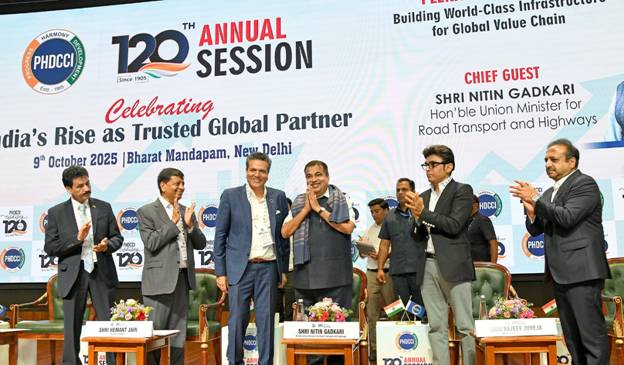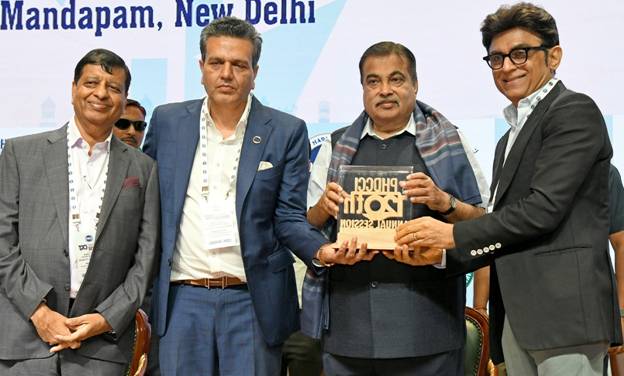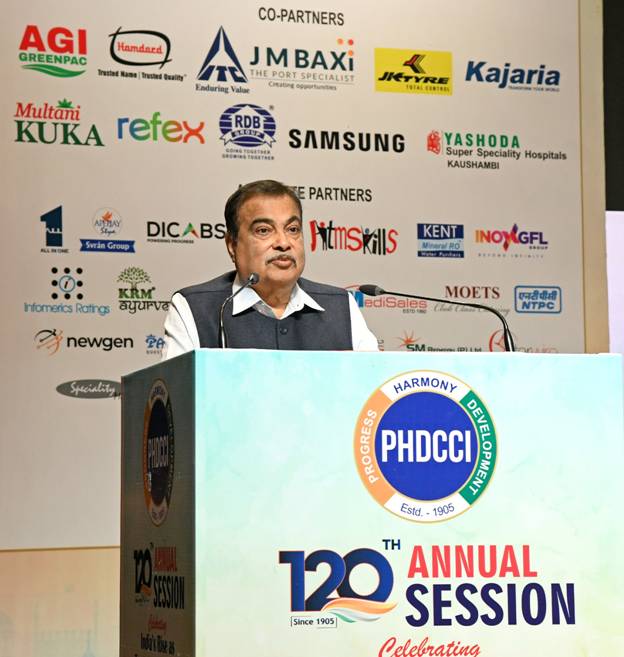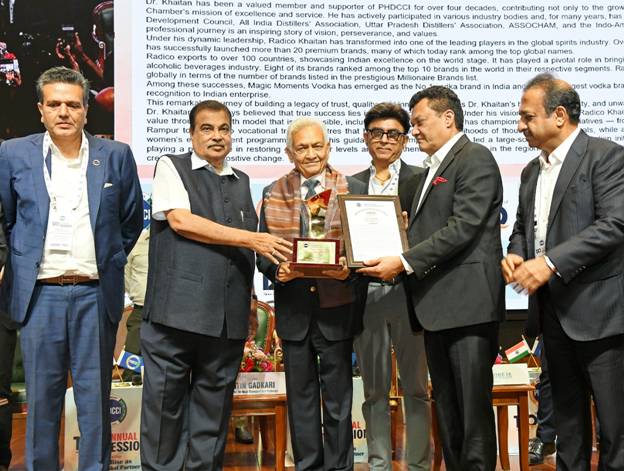Ministry of Road Transport & Highways
India’s aims to achieve economic growth of USD 5 trillion by 2027: Union Minister Shri Nitin Gadkari
India overtakes Japan to become the third-largest automobile market in the world with an industry size of ₹22 lakh crore
प्रविष्टि तिथि:
09 OCT 2025 6:21PM by PIB Delhi
The Union Minister for Road Transport and Highways, Shri Nitin Gadkari expressed gratitude to all stakeholders for their contribution to India’s economic growth and reiterated the Government’s goal of achieving a USD 5 trillion economy by 2027 under the leadership of the Prime Minister Shri Narendra Modi. He also highlighted the national vision of making India a developed nation by 2047. Addressing the 120th Annual Session of the PHD Chamber of Commerce and Industry (PHDCCI) in New Delhi today.
Shri Gadkari emphasized that alongside physical progress, three key pillars—Ethics, Economy, and Ecology/Environment—must guide national development. He stated that ethical values are essential to maintain a healthy social and family system, and underlined the importance of integrated thinking, coordination and cooperation among all sectors.
Citing the example of the automobile industry, the Minister said that when the present Government took office in 2014, India’s automobile industry ranked seventh globally with a valuation of ₹14 lakh crore. He informed that India has now overtaken Japan to become the third-largest automobile market in the world with an industry size of ₹22 lakh crore. He expressed confidence that with advancements in research, innovation, and adoption of alternative fuels such as ethanol, methanol, bio-diesel, LNG, electric and hydrogen fuels, India could become the leading automobile manufacturing country globally within five years.
The Minister noted that the use of alternative fuels would help reduce crude oil imports worth ₹22 lakh crore annually. He explained how ethanol production policy reforms have increased the market price of maize, benefiting farmers, especially in Uttar Pradesh and Bihar, adding ₹45,000 crore to their income. He emphasized that reduced imports and increased domestic production will lead to higher growth, purchasing power, and employment.
Shri Gadkari shared the example of the recent launch of electric truck battery swapping in Sonipat, highlighting its economic viability compared to diesel. He noted that electricity costs per kilometre are significantly lower than diesel, thereby reducing logistics costs. He mentioned that due to infrastructure improvements, India’s average logistics costs have decreased from 16% of GDP and expressed confidence that by the end of this year, logistics costs would fall to single digits at around 9%.
Shri Gadkari underscored the importance of innovation, research, and entrepreneurship, stating that “no material is waste and no person is waste.” He shared examples of projects such as converting sewage sludge in Mathura into bioenergy and utilizing legacy waste for road construction. He informed that around 80 lakh tonnes of waste have already been used in road projects, contributing to environmental sustainability.
Shri Gadkari called for balanced development across agriculture, manufacturing, and services sectors. He urged the industry to give priority to the growth of the agriculture and allied sectors, noting that balanced growth was essential for reducing migration and strengthening the rural economy.
He reiterated that infrastructure development serves as the backbone of the economy, generating employment and government revenue while contributing significantly to GDP growth. He highlighted that an investment of ₹100 in national highways contributes ₹321 to GDP.
Referring to the financial models being implemented in road development, Shri Gadkari mentioned that under the Infrastructure Investment Trust (InvIT) and Toll-Operate-Transfer (TOT) models, the Ministry has successfully mobilized funds through the capital market. He said that the first InvIT bond issue was oversubscribed seven times within hours, demonstrating investor confidence. He emphasized the importance of decentralizing wealth to strengthen the economy by making small investors and workers prosperous.
The Minister also spoke about ongoing infrastructure projects including 25 Greenfield Expressways connecting major cities and ports across the country. He informed that new tunnels and corridors such as the Zojila Tunnel and Delhi-Katra-Amritsar Expressway are being constructed to improve connectivity and reduce travel time. He highlighted that the development of tourism circuits like the Buddhist Circuit and ropeways in Kedarnath will promote religious tourism and revenue generation through public-private partnerships.
Shri Gadkari concluded by reiterating that the Government’s vision focuses on creating safe, convenient, sustainable, and economically prosperous infrastructure that generates employment, boosts exports, and supports inclusive national development.
The Minister also gave away PHDCCI Business Practices & Awards 2025, recognizing Excellence in Industry.




***
SK/GDH/DS/HK
(रिलीज़ आईडी: 2176932)
आगंतुक पटल : 1850